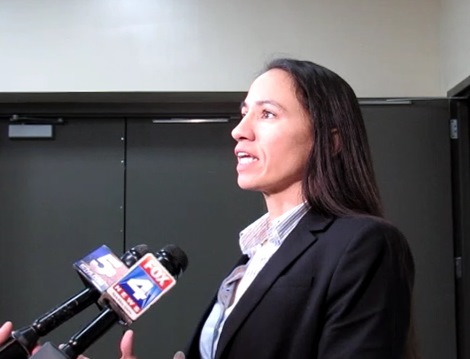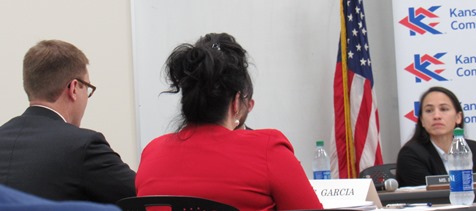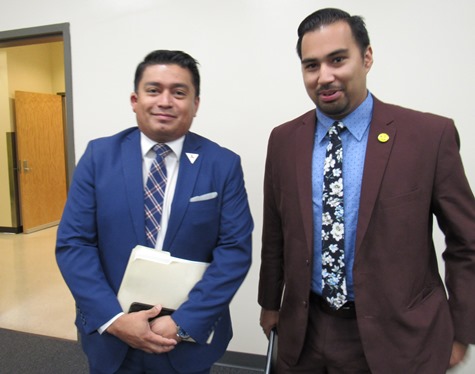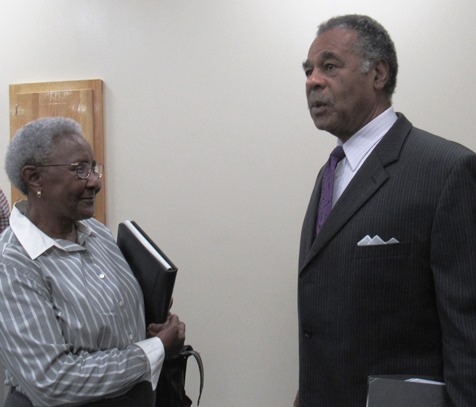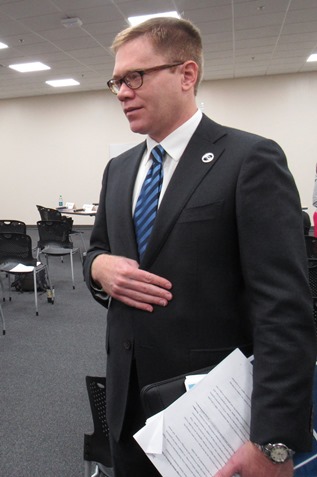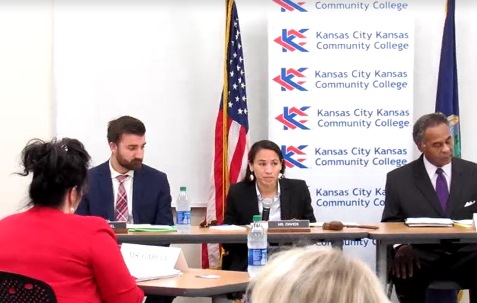
by Mary Rupert
A Congressional field hearing held in Kansas City, Kansas, today discussed how to provide high-tech small businesses with the trained technology personnel they need to compete.
“With the growing skills gap and increasing retirements from our aging population, small businesses are having a harder time than ever attracting a high-skilled workforce,” U.S. Rep. Sharice Davids, D-3rd Dist., said at the hearing.
Rep. Davids invited the U.S. House Small Business Committee to the Dr. Thomas Burke Technical Education Center, Kansas City Kansas Community College, 6565 State Ave., where testimony was taken about the challenges facing small businesses in Kansas. KCKCC-TEC offers a variety of courses in the technology area.
U.S. Rep. Emanuel Cleaver, D-Missouri, also attended the hearing, with Kansas Commerce Secretary David Toland, Kansas Labor Secretary Delia Garcia and Thomas Salisbury, regional administrator for the Small Business Administration, among those who testified on Tuesday. There also were several representatives from businesses who testified.
A workforce shortage of highly skilled technology workers has affected small businesses, according to Rep. Davids. Their potential for growth is limited when companies are unable to fill positions that require technical skills, she said.
There are thousands of high-paying jobs in the area requiring special technology skills, she said, and there is a need to align education for these skills in colleges as well as in other institutions and on-the-job training.
While Kansas City is the best city in the world for technology start-ups, it cannot reach its full potential without a skilled workforce, she said.
Two of the programs mentioned Tuesday included the Small Business Innovation Research (SBIR) and the Small Business Technology Transfer (STTR). The SBIR provides some research and development grants for small businesses. In the STTR, federal agencies with research and development budgets of $1 billion or more are required to place part of the funding to a research and development programs for small businesses.
David Toland, Kansas commerce secretary, said the state has taken a lead in the past for technology and innovation.
About 9 percent of the Kansas City workers on the Kansas side are in technology occupations, he said, quoting from a recent KC Tech Council report, and Kansas City has the seventh highest net gain in in tech talent labor in the largest North American labor markets over the past five years.
However, there has been a decline in some tech statistics in Kansas recently.
“Once a leader in tech and innovation, Kansas has somewhat fallen behind in recent years as a whole. We’ve experienced a loss of both tech jobs and tech businesses in the state. In 2018 Kansas posted the second highest amount of tech job losses among all 50 states and a net loss of total tech businesses operating in the state as compared to 2017.
“Simply put, this is not acceptable,” Toland said. “We have an obligation to the people of Kansas to understand what is driving this decline and to make the necessary corrections and adjustments to change the trajectory of tech and innovation in Kansas.”
Toland said some programs already are in place to address the decline, such as the Angel Investor tax credit program that provides incentives to start-ups here. Another are workforce development programs such as Workforce AID (Workforce Aligned with Industry Demand) program, that brings together representatives of government, business and higher education to address specific workforce needs, he said.
Toland also said the Commerce Department has added a new director of strategy for technology and bioscience, Trent Armbrust, in a new leadership role to advance new technologies and support research.
The Commerce Department also has been directed by Gov. Laura Kelly to research and analyze the Kansas economy and make an economic blueprint for the state, Toland said, which will include strategies for business recruitment and retention. This week the Commerce Department announced it has begun work on the Kansas Framework for Growth.
This plan will focus on what it will take to grow the tech sector of the economy, including partnerships with businesses and higher education to develop a highly skilled workforce to fill knowledge jobs they want to recruit to the state, Toland said.
“These are just a few of the steps the state of Kansas has taken to begin regaining our position as a leader in technology and innovation, but we have a long, challenging road ahead,” Toland said. “Technology is redefining our economy and our lives at a fundamental level, and we must find ways to make Kansas competitive again. The future of our economy depends on it.”
Kansas Labor Secretary Delia Garcia said unemployment in Kansas is at the lowest since May 1999 with 3.2 percent statewide.
“Though these numbers are good, we remain in a tight labor market like the rest of the U.S. It is an opportune time to focus on areas where we could position Kansas as a leader in our country,” Garcia said in her testimony.
She presented statistics that projected growth in job openings for computer and mathematical occupations in Kansas through 2026. For example, there were 7,420 computer user support specialists in Kansas currently, with 148 job openings in 2019 and 719 projected annual job openings through 2026, according to Kansas Department of Labor projections.
The Kansas Department of Labor also projected 1,867 job openings through 2026 for registered nurses, the largest number of job openings for any category on the Labor Market Overview for STEM Occupations in Kansas, according to KDOL information. There are currently more than 27,000 RNs in Kansas, according to the data.
Another category expected to grow is software developers, applications, where the current employment is 5,570, current job openings are 310, and projected annual job openings through 2026 are 553, according to KDOL data.
Kansas City, Kansas, Chamber of Commerce President Daniel Silva, who attended the hearing, said before the hearing he hoped this hearing brings more awareness, continued support for small business, interest in bringing technology and innovation to Kansas City, Kansas, and attracting companies to Wyandotte County.
“I think it would be great to have more of those types of business come to Wyandotte County,” he said before the hearing began. “It’s also important to support existing small businesses.”
Silva presented testimony at the committee hearing in support of smart regulation and legislation, programs and access to opportunities that will position entrepreneurs, start-ups and local small businesses for growth and sustainability.
“We are in favor of continued support of a high-quality education pipeline that creates a career-ready workforce for the benefit of all Kansans,” Silva stated in his testimony. “The KCK Chamber supports the collection of sales and use tax on e-commerce sales, in which sales tax are collected in such a way that does not place an unreasonable or onerous compliance burden on business, specifically small business that have less ability to administer compliance.”
Written testimony that was submitted to the Small Business Committee by Ruben Alonso of AltCap stated that some small area companies believe that access to capital is important and can help spur the growth of technology companies here. About 80 percent of venture capital is concentrated on the coasts, according to Alonso’s written testimony.
Another company, Snap IT Solutions, submitted written testimony that they could solve the workforce problems through their training programs for applications. The company provides managed services in information technology. According to written testimony from Neelima Parasker of Snap IT Solutions, Kansas doesn’t need to import people from the coasts, it just needs to develop local talent.
Another company, Menlo, that provides managed service for schools, discussed the lack of an adequately trained and available work force for open tech jobs in its written testimony from Bradley Sandt. According to Menlo, the Kauffman Foundation and the Greater Kansas City Chamber of Commerce are chairing workforce development committees. With a trend of changing jobs, there are not enough experts in their fields, according to the written testimony.
To reach Mary Rupert, editor, email [email protected].
